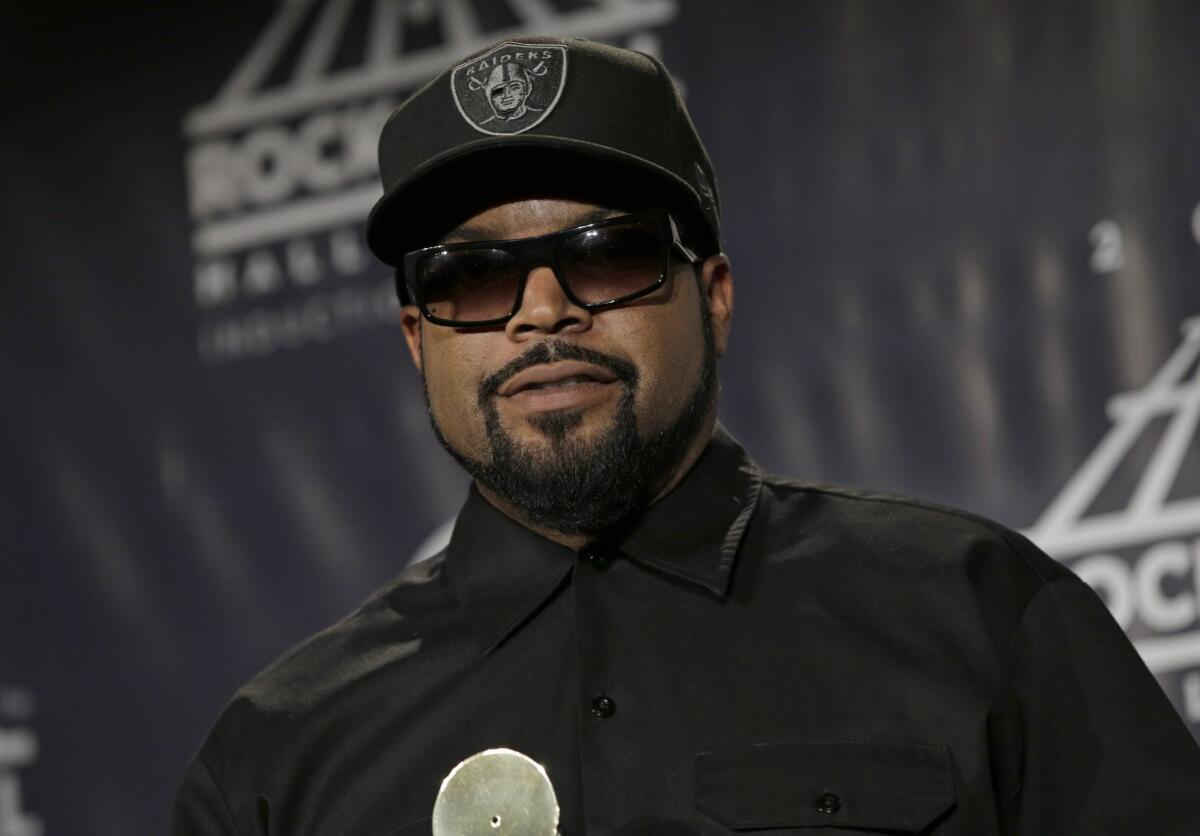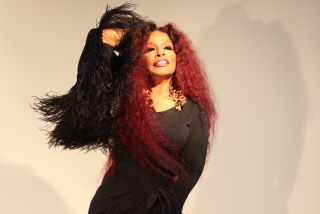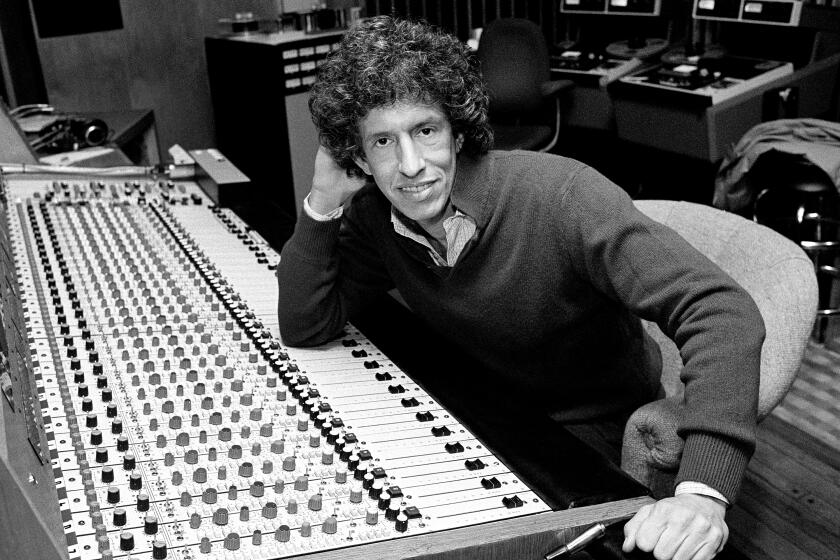Ice Cube on N.W.A’s Rock and Roll Hall of Fame induction: ‘Hip-hop is here forever’

Rapper Ice Cube is seen at the 31st annual Rock and Roll Hall of Fame Induction Ceremony at the Barclays Center in Brooklyn, N.Y., on Friday.
- Share via
From the Gangster of Love to gangsta rap, five decades of pop music history — along with a bit of controversy — passed across the stage of the Barclays Center on Friday night for the 31st annual Rock and Roll Hall of Fame Induction Ceremony.
The night celebrated hard rockers (Deep Purple), horn rockers (Chicago) and garage rockers (Cheap Trick), but it was a member of rap’s N.W.A who delivered the most stirring statement of the night.
The Compton group’s co-founder Ice Cube, who will perform high on the bill at Coachella later this month, was responding to the suggestion from rock traditionalists that the groundbreaking group who pioneered gangsta rap was too far outside the genre to deserve its honor.
“The question is are we rock ‘n’ roll?” he said. “And I say ... right we’re rock ‘n’ roll. Rock ‘n’ roll is not an instrument. Rock ‘n’ roll is not even a style of music. Rock ‘n’ roll is a spirit. ... Rock ‘n’ roll is not conforming. Rock ‘n’ roll is outside the box, and rock ‘n’ roll is N.W.A.”
Cube’s remarks expanded on the response he has given in interviews to comments made by Kiss member Gene Simmons, who recently told a reporter he was “looking forward to the death of hip-hop.”
The rapper-turned-actor/director referenced the aged rocker directly from the Barclays stage, proclaiming, “Hip-hop is here forever.”
There were no other provocative onstage moments during the celebratory night in Brooklyn, where the inductees’ introductions recounted the hard work, persistence and durability of each act despite deaths, disputes and personnel changes. The groups all performed with a studio-like slickness undoubtedly honed by years of constant touring, some of which continues today.
Inductee Steve Miller thanked his godfather, guitar legend Les Paul, and said he was 5 when he learned his first chords from Paul. Miller’s passage through Chicago blues clubs and San Francisco psychedelia before he became a multiplatinum-selling stadium-filler in the mid-1970s makes him a one-man rock encyclopedia.
But Miller was critical of the Hall of Fame organizers afterward, saying, “The whole process is unpleasant.” He complained how he was allowed only two tickets to the event and that any additional ones would cost him $10,000.
For the most part, the inductees expressed gratitude for having such enduring careers.
N.W.A’s Dr. Dre, now a famed producer and CEO, remarked that the group’s success was “proof to all the kids out there growing up in places similar to Compton that anything is possible.” It was a sentiment echoed by other artists, who recalled their early days in family basements, small clubs and endless travels on the road while pursuing their art and dreams.
The ceremony was a long time coming for the mainstream inductees — “Finally, we’re here,” said Deep Purple’s former bassist Roger Glover — who created the most iconic sounds and images of the classic-rock era.
The fonts for Cheap Trick and Chicago and the Pegasus logo for the Steve Miller Band — all displayed prominently throughout their performances — are as famous as the group’s songs, a sign of how the star-making machinery of the recording industry was operating at its peak in the 1970s.
In Metallica drummer Lars Ulrich’s introduction of Deep Purple, he noted how the opening four-note riff of the band’s anthem “Smoke on the Water” has been “banned from music stores to preserve the sanity of the staff.”
Other presenters also made an effort to give the longer-running inductees, whose audiences now heavily skew toward AARP members, some current-day respect.
“If you think Chicago is your mom’s band, then I want to party with your mom,” said Rob Thomas in his introduction of the group.
The audience also was reminded of how Chicago’s early music was steeped in the social turmoil of the late 1960s. James Pankow recalled an incident at Dodger Stadium when bandmate Peter Cetera got into a fight with a Marine. Ten days later, Cetera performed on tour with a wired jaw.
The show opened with a performance from The Roots, David Byrne and Kimbra of the late David Bowie’s “Fame.” Bowie’s “Lazarus” played over the “In Memoriam” segment, which recognized other artists, executives and producers, including country legend Merle Haggard, who died Wednesday.
Sheryl Crow paid tribute to the late Glenn Frey with a soft acoustic version of The Eagles’ hit “New Kid in Town.”
Honoring band members who didn’t live to see their induction was also a running theme of the night. Thomas joined Chicago on vocals for “Does Anybody Really Know What Time It Is?:
Deep Purple recognized the late Jon Lord with a rendition of the group’s 1968 breakthrough hit “Hush,” while an array of photos of the innovative Hammond C3 organist was projected on the stage.
N.W.A, which broke up in 1991, reunited for the ceremony. They referenced their late bandmate Eric “Eazy-E” Wright, who died of AIDS in 1995, when accepting their award.
“All he cared about was for our story to be recognized and heard,” Cube said. “He was a smart businessman, and he knew the pulse of the people.”
Correction, April 11, 1:15 p.m.: James Pankow’s name was spelled incorrectly in an earlier version of this story.
Twitter: @SteveBattaglio
More to Read
The biggest entertainment stories
Get our big stories about Hollywood, film, television, music, arts, culture and more right in your inbox as soon as they publish.
You may occasionally receive promotional content from the Los Angeles Times.











